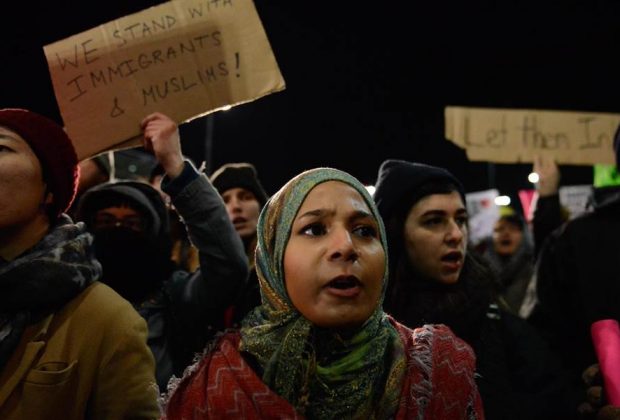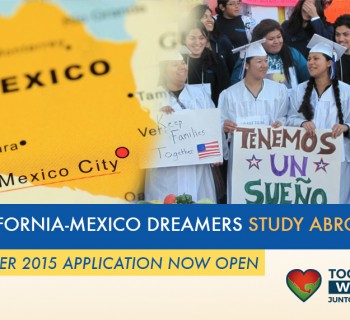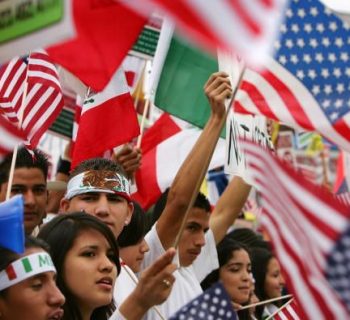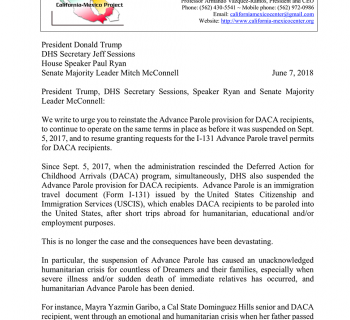By Dan Berger and Stephen Yale-Loehr
We planned to write a blog about the revised travel ban Executive Order as soon as it came out. That the revised order has not been issued yet highlights the uncertainty we face in 2017. Given the pause before the revised travel ban Executive Order comes out, we discuss below 12 frequently asked questions as best we can.
1. Is domestic airplane travel OK? This may sound like a simple question, but recent events suggest more caution may be wise. For example, Immigration and Customs Enforcement (ICE) agents met a plane last week landing at JFK Airport in New York City, and asked everyone about their immigration status.[1] The agents were looking for someone who had an old deportation order, but it is possible that anyone without evidence of status could have faced delays. This is a good time to remind ourselves that the law requires anyone who is not a U.S. citizen to carry evidence of status at all times (green card, temporary visa, etc.). Try to make it easy for a government officer.
2. Isn’t that overreacting based on one incident? Maybe, but the bigger picture is that immigration enforcement agents have more discretion and wider operating room than before.[2] Two new memos issued by the Department of Homeland Security (DHS) last week allow for "expedited removal," which is a fast track process that skips a hearing with an immigration judge.[3] Expedited removal now can apply to anyone who entered the country within the past 2 years (used to be 2 weeks), and anywhere in the United States (used to be within 100 miles of the border). Expedited removal happens quickly, sometimes within a matter of days. Having a copy of a document showing status and that you have been in the United States more than two years could help avoid questioning and expedited removal.
3. How about electronic devices? Can those be searched at the airport or border? The simple answer is "yes," and this is happening more often.[4] We recommend that private information, such as a doctor with patient information, should be encrypted. According to the Customs and Border Protection (CBP) website,[5] CBP officers may search laptops, cell phones, or other electronic devices. CBP may not select someone for a personal search or secondary inspection based on religion, race, national origin, gender, ethnicity, or political beliefs. U.S. citizens may be questioned and have their devices seized for refusal to provide passwords or unlock devices, but cannot be kept from the United States. Noncitizens may, however, be denied entry. Adding to the uncertainty about how this will play out is a section in one of the January Executive Orders that directs federal government agencies to make sure they "exclude persons who are not United States citizens or lawful permanent residents" from Privacy Act protections concerning personal information.
4. What does this mean for people from the seven countries covered by the original travel ban? The courts temporarily halted this travel ban, so they can travel, right? At the moment, people with visas from the seven countries are getting into the United States. News reports indicate that a new Executive Order will be released this week allowing green card holders and those with valid visas from one of the seven countries to enter the United States.[6] The State Department has confirmed that people who had visas canceled need to re-apply for a new visa at a U.S. consulate (or in rare cases at the request of CBP get a "boarding letter" from the consulate), but people in the United States whose visas were provisionally revoked by a January 27 DOS letter are reinstated. Some are getting visas approved abroad, while others are facing delays. The situation is uncertain. The White House press secretary has pledged to continue fighting for the original travel ban. The court orders so far are all temporary, with more legal arguments and decisions to come.[7] Travel for citizens of the seven countries remains a calculated risk.
5. What does this all mean for DACA recipients? The January Executive Orders state that the deferred action for childhood arrivals (DACA) program remains in effect. This is good news for the 750,000 plus people who have DACA. However, continuation of the program is not guaranteed. And the Executive Orders call for greater enforcement against anyone with any kind of criminal issue or with a previous deportation order. Some DACA recipients have minor criminal issues - will they be able to renew? Some recipients have previous deportation orders - how will they be treated? DACA recipients should be extra careful to carry their DACA approval and work card with them, should keep investigating ways to get back into status, and talk to an attorney or legal service agency if they have ANY criminal issue, no matter how minor.
6. What does this mean for undocumented parents of students who want to fly to the United States for their child’s graduation? Some of them have visited the United States before with no problems. President Obama's "Priorities Memo" used the idea of prosecutorial discretion to give some level of comfort to those at the bottom of the priority list for enforcement. The new orders make clear that there is a top of the list, but no bottom. The law is the law, and anyone undocumented who is caught could be removed. Anyone who is undocumented who is considering traveling should talk to an attorney or legal service agency to evaluate their own particular situation. For example, - www.immigrationlawhelp.org has a list of accredited agencies. Also, this is not a completely new situation. Every year we see family members abroad who do not receive tourist visas to come to the United States. For those situations, some schools have set up a Skype feed of the ceremony through someone's cell phone, or sent the family a photo of the student graduating, or other clever ways of trying to include the family in the event.
7. Speaking of DACA, can many of them really move beyond DACA now? Possibly. It is certainly worth asking. Many filed for DACA on their own, and have never had a legal consultation despite the fact that their immigration histories can be incredibly complicated. Most interestingly, a growing number of DACA recipients got DACA under age 18 ½ and now have degrees. Those people MAY (emphasize "may") not have what is called "unlawful presence," and MAY be able to consular process an employment based visa or green card.
8. Going beyond travel, are there any other ways campuses can prepare for new immigration enforcement priorities, short of declaring a "sanctuary campus"? Yes, there are some basic steps that campuses can take. One set of model guidelines focuses on interaction with government officials.[8] Campus response has varied but generally been strong in favor of international education and diversity. A Washington Post article found that the vast majority of schools have made some kind of statement.[9] Some schools have been concerned about the political effects of opposing the travel bans. They worry that if they declare themselves immigration sanctuaries they may put a target on their backs. While some schools may be less vocal in their responses, most are supporting students and scholars who are concerned, and connecting students with extra services including counseling and legal services.
9. If I feel my school is not doing enough, what can I do? In immigration, stories matter. For example, an Iranian graduate student may be thinking of leaving the United States to do a post doc in another country, or cannot travel to present work at a conference abroad, or is simply not sleeping or eating well out of concern, or have a spouse is not still able to enter the United States. These stories help show the real impact of the travel ban. And facts matters - there are some good articles and websites that provide data on the basis of the travel ban and the effects, and also on the positive impact of immigrants on our economy.[10]
10. I heard the Executive Orders canceled all of President Obama's orders except for DACA. Does that include the "sensitive locations" memo that said enforcement will not take place at sensitive locations such as campuses, hospitals, etc.? It appears that the ban on enforcement at sensitive locations survives. This policy is still on the ICE website, and in a DHS Q&A.[11] We hope this will continue.
11. Is it true that the Administration and Congress plan to cut back F-1 STEM OPT and the H-1B program, and raise the minimum salaries for H-1B workers? There are a lot of ideas and secret draft memos floating around Washington how to "fix" immigration, including the H-1B system. Bills pending in Congress would amend the H-1B process. The White House may ask DHS to conduct a study of the visa process to determine which visa regulations may or may not be in the national interest, and to make recommendations how to improve visa systems, including the H-1B system. Are we sure that nothing like this will happen quickly, surprising us the way the travel ban did? Not sure, but passing legislation in Congress and amending federal regulations are normally long-term projects. Remember, the Obama administration was successfully sued for trying to make big changes without formal procedures.
12. That's 11 questions - anything else I should know? We all need to remember the energy it takes to operate in uncertainty. In a recent presentation at a university, the director of the counseling center explained that uncertainty can be more tiring and emotionally challenging than bad news. At least with bad news, we can focus attention on how to address it. So hang in there!
References:
[1] https://www.theatlantic.com/politics/archive/2017/02/papers-please/517887/?utm_source=fbb.
[2] https://www.nytimes.com/2017/02/25/us/ice-immigrant-deportations-trump.html.
[3] The DHS memos and accompanying fact sheets and Q&As are at https://www.dhs.gov/executive-orders-protecting-homeland.
[4] For general information on the rights of travelers regarding social media accounts and electronic devices, see https://www.aclu.org/know-your-rights/what-do-when-encountering-law-enforcement-airports-and-other-ports-entry-us. For an interesting NPR piece on this issue, see http://www.wbur.org/hereandnow/2017/02/16/border-agent-unlock-phone.
[5] https://www.cbp.gov/border-security/protecting-nation-foreign-terrorist-entry-united-states.
[7] For a general summary of the situation, see https://www.washingtonpost.com/national/appeals-court-wont-put-trumps-travel-ban-case-on-hold/2017/02/27/0eaaaa52-fd28-11e6-9b78-824ccab94435_story.html?utm_term=.be3edc5fc75f.
[8] https://www.nilc.org/issues/immigration-enforcement/campus-safe-zones-language-college/.
[10] https://www.washingtonpost.com/opinions/the-evidence-for-trumps-travel-ban-simply-isnt-there/2017/02/27/90e228ac-fd36-11e6-8f41-ea6ed597e4ca_story.html?utm_term=.8196709a3ca9;
https://www.washingtonpost.com/graphics/national/visas-impact/;
https://immigrationimpact.org.
[11] https://www.ice.gov/ero/enforcement/sensitive-loc;
https://www.dhs.gov/news/2017/02/21/qa-dhs-implementation-executive-order-border-security-and-immigration-enforcement (Question 28).







